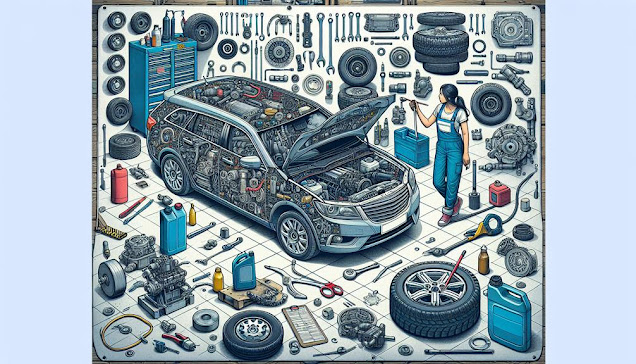Key Auto Repair Maintenance Tips for Long-Lasting Vehicle Performance
Maintaining your car in excellent condition not only extends its lifespan but also prevents expensive breakdowns and repairs. Consistent maintenance is critical for ensuring your vehicle runs safely and efficiently. By applying a few essential auto repair maintenance practices, you can keep your car operating smoothly and avoid unnecessary costs.
1. Prioritize Regular Oil Changes for Auto Repair Longevity
Oil is vital to the health of your car’s engine. It lubricates essential parts, reduces friction, and helps maintain the engine’s temperature. Neglecting routine oil changes can lead to engine wear and potentially serious damage, resulting in costly repairs. Manufacturers typically recommend changing oil every 5,000 to 7,500 miles. However, it’s crucial to consult your vehicle’s manual for specific guidance. Keeping a record of oil changes enhances engine efficiency and durability.2. Keep an Eye on Tire Pressure and Condition
Tires are essential for maintaining safety and fuel efficiency. Driving with under-inflated tires can reduce mileage and cause uneven tread wear, while over-inflated tires may negatively affect traction. Check your tire pressure regularly—at least once a month and before long drives. Also, inspect your tires for visible wear and rotate them every 6,000 to 8,000 miles. This ensures even tire wear and helps maximize their lifespan.3. Replace Air Filters to Optimize Auto Repair Performance
A clogged air filter can limit airflow to the engine, decreasing overall performance and fuel efficiency. Most experts recommend changing air filters every 12,000 to 15,000 miles. However, if you frequently drive in dusty or polluted environments, replacing them sooner is advised. Clean air filters contribute to smoother engine operation and better gas mileage.https://medium.com/@starautomotivellc123/the-value-of-seasonal-auto-repair-and-maintenance-36861a80ec35
By adhering to these essential maintenance tips, you can minimize the risk of unexpected breakdowns and avoid costly auto repair bills. Consistent upkeep ensures your vehicle remains dependable and efficient. Make a habit of scheduling regular inspections and addressing minor concerns before they develop into significant problems. Taking preventative measures now will help ensure that your car stays in peak condition for many years to come.
4. Maintain Proper Fluid Levels
Your vehicle depends on several key fluids to function properly, such as coolant, transmission fluid, brake fluid, and power steering fluid. Regularly check fluid levels and replenish them as necessary. Dirty or low fluid levels can lead to mechanical problems and diminish overall performance. Monitoring fluids consistently can help you avoid expensive auto repairs.5. Conduct Frequent Brake Inspections
Brakes are crucial for ensuring your safety on the road. Pay attention to signs such as grinding or squealing noises and reduced braking responsiveness. These symptoms may indicate worn brake pads or other issues. Brake pads typically require replacement every 25,000 to 70,000 miles, based on driving patterns. Addressing brake issues early can prevent accidents and more expensive repairs.6. Don’t Overlook Warning Lights
Modern vehicles are equipped with dashboard warning lights to notify drivers of potential problems. Never ignore these alerts. Respond to warning lights immediately to prevent further damage. Whether it’s a check engine light or a low tire pressure warning, prompt action can save you from costly repairs and keep your vehicle running smoothly.By adhering to these essential maintenance tips, you can minimize the risk of unexpected breakdowns and avoid costly auto repair bills. Consistent upkeep ensures your vehicle remains dependable and efficient. Make a habit of scheduling regular inspections and addressing minor concerns before they develop into significant problems. Taking preventative measures now will help ensure that your car stays in peak condition for many years to come.



Comments
Post a Comment